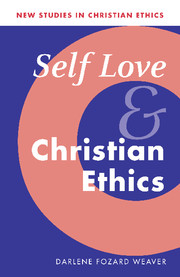5 - Self love and moral action
Published online by Cambridge University Press: 12 November 2009
Summary
Previous chapters showed that the person freely decides about herself in relation to God. This decision, in its material specificity, constitutes the person's identity. This chapter asks how the person's categorical moral choices and actions condition and constitute her response and how her response shapes and directs her categorical choices, even her capacity to reason morally. It explores the status of concrete acts and relations by engaging conceptual frameworks of being and by appealing to the norms of love for God and neighbor. This chapter suggests that (1) moral action entails a creative self-constitution in light of particular situations; (2) moral development consists in a fundamental self-interpretation of oneself in relation to God, who has acted on behalf of the person first; and (3) a hermeneutical account of self-relation helps to specify the kinds of acts and relations that are/are not ordered to the self's authentic good.
IDENTITY AND INTEGRITY
My description of embodied integrity is indebted to and departs from the account of integrity that William Schweiker offers. Schweiker's account of integrity begins with the claim that there are two levels of goods. The first, lower level of goods includes bodily, social, and reflective goods. It is multi-dimensional. Persons encounter and recognize these goods in their sensory experiences of values and disvalues (e.g., pleasure and pain). They also encounter and recognize them in social roles and relations by which they identify themselves and are identified by others.
- Type
- Chapter
- Information
- Self Love and Christian Ethics , pp. 167 - 207Publisher: Cambridge University PressPrint publication year: 2002



